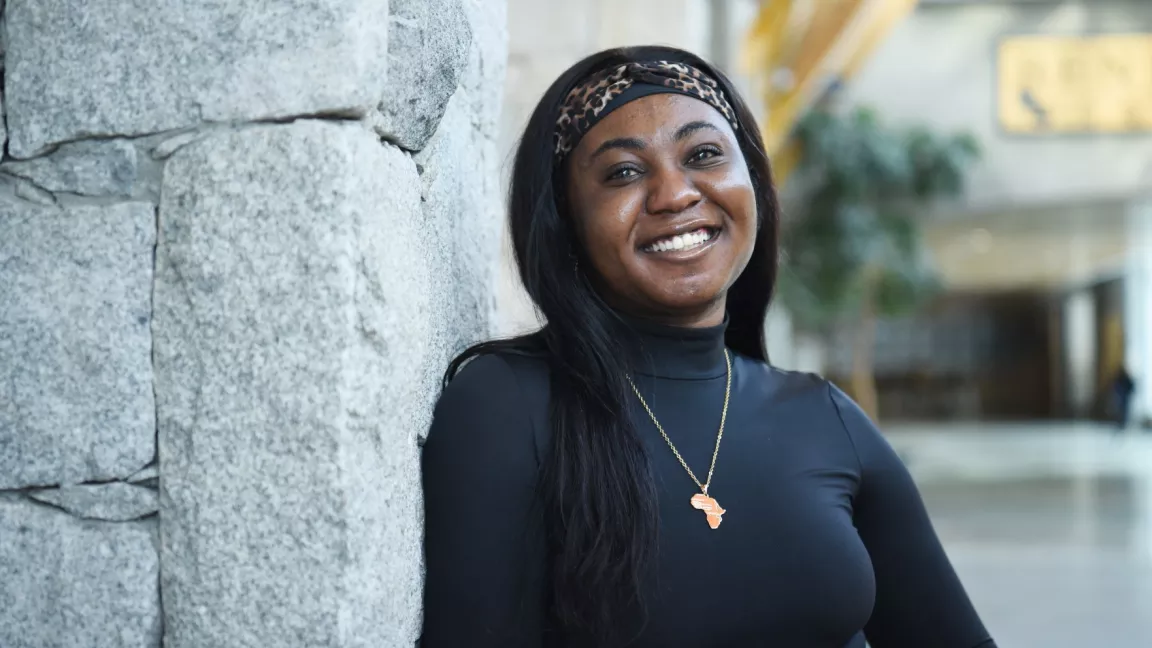Finding community
Women's and Gender Studies student Akua Agyei has found support and community through her participation in the Afro-Caribbean Student Association.

Researching Black History Month has reinforced when Akua Agyei has known all her life.
“Black is beautiful. Black is excellent. Black people are amazing,” says Akua, a fourth-year Women’s and Gender Studies major. “I look forward to matching the same energy of those that came before me and leaving an impact that is greater than myself.”
Through her involvement in the Afro-Caribbean Student Association (ACSA), Akua has been engaged with educating the UNBC community about Black history. It’s a role she’s found fulfilling, and has given her a chance to learn more about her roots in Ghana.
“Coming from a country where slavery is embedded in my history, I thought I had enough knowledge about my ancestry,” Akua says. “The more I researched the more I learned about my Black and African culture. It became apparent to me that being black or African was something bigger than you think.”
Akua first got involved with ACSA when she came to UNBC in 2019. She’s progressively taken on more of a leadership role with the student-led organization, first as a social media co-ordinator in 2020 and then as president in 2021.
Before the COVID-19 pandemic, Akua says she always looked forward to the weekly in-person meetings. It was a chance for her to connect in a safe space with like-minded students who are committed to fostering an engaging discourse about Black people and to plan fun events to raise awareness and share knowledge.
“Our fashion show was the highlight of 2020, seeing everyone come out to support us as we showcase our talent and heritage was amazing,” she says. “It felt like I belonged somewhere like home where being Black or African is appreciated.”
Akua says there is more UNBC can do to lift up Black voices as well as the voices from other underrepresented groups on UNBC campuses.
“I know UNBC is trying their best to be as diverse as possible and we appreciate the effort,” she says. “But it shouldn't be that our voices are being heard only during Black History Month or when something is happening globally, such as the pandemic, which impacts international students.”
Akua wants to see more opportunities for Black students to share knowledge and expertise with the UNBC community.
“We should be given the same platform as everyone else to be able to express ourselves as much as we do, what we don't need is a global tragedy to tell the school how we feel,” she says. “It should be an ongoing thing where international students can come as one to create awareness.
“Many students might not feel comfortable at first, but if it becomes a thing where the international office, or any other UNBC department, shows concern or interest, I'm sure international students will come out of their shell rather than laying back all the time.”
For students looking to share their voices, joining ACSA is a great way to find a community of supportive, friendly and interesting people. And they’re always looking for new members.
“ACSA provides a space for a complete and unapologetic celebration of African and Caribbean people history, and culture,” Akua says. “Our members are key in making this a reality. Whether you wish to be involved in decision-making and planning or just wish to volunteer your time at various events, your input matters. We come together as a family and we are always there for each other no matter what.”